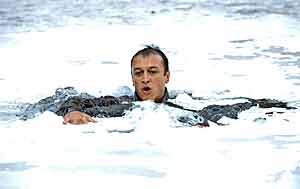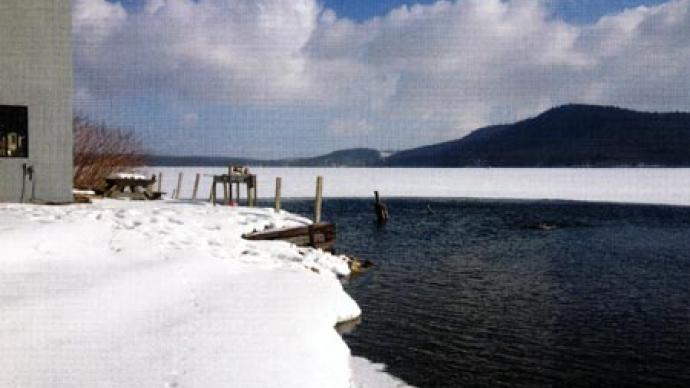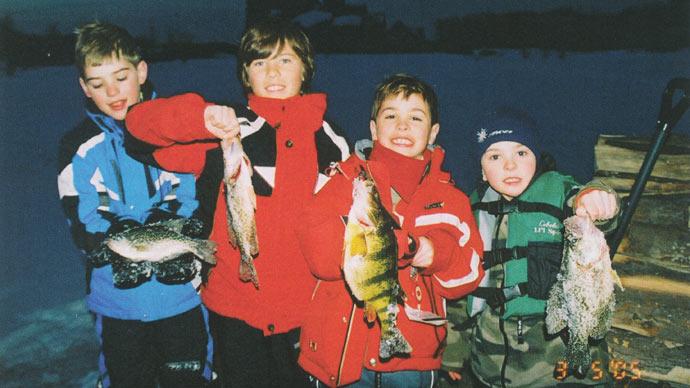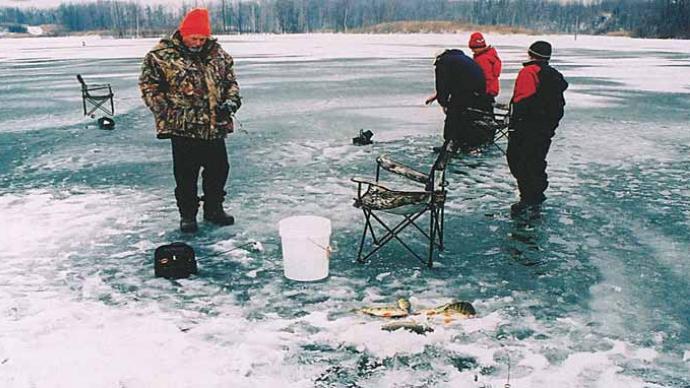
The best way to avoid falling through is to not go out on the ice at all. But for those of us in the north who live and recreate outdoors... we will eventually find ourselves on the ice. Ice fishing, trapping, ice skating, ice boating and cross country skiing are a few activities where you may find thin ice.
I don't consider "falling through" breaking through ice and getting your toes wet. "Falling through" means going in at least up to your chest. With that defined, I have fallen through ice three times while ice fishing and once while trapping. My father (Randy) and brother (Scott) have fallen through a dozen or more times, all while trapping. Are we stupid? Debatable, but I'd like to think not. Did we go out on thin ice? Not intentionally. Thin ice can be formed by aeration, moving water, springs and ... what usually gets me ... muskrats and beaver moving under ice.
God forbid ... if you fall through, here is our best advice.
Avoid falling through in the first place. Stay away from beaver houses, dams and runs, muskrat houses and runs, otter holes, seeps, springs, running water, pressure cracks, aerators springs, running and other areas that may cause thin ice. I will not let my students out on less than six inches of ice, ever. In my opinion, six inches is minimum thickness of safe ice.
- Every ice fisherman has done this... don't lay boards, pallets, ladders or other aids to cross open water to get to "safe ice." This is asking to fall through. If there is unsafe ice around edges, chances are there are other unsafe areas.
- Every time you are on ice (or anywhere outdoors), tell someone where you are and when you plan to return. If you don't come home, someone can go out and look for you. Go fishing with a buddy. One of my friends had a close call three years ago, when a buddy saved his life when he fell through and could not get out alone. He had broken through four inches of ice and had to be pulled out with a rope.
- Carry a rope with you. A fifty foot rope is critical to someone trying to pull you out. In most cases I have used the rope more to help OTHER people, rather than myself.
- Whenever you walk out on the ice, have a plan to self-rescue. Develop a mental plan on what your actions will be when you fall through (notice I did not say "IF").
- When you fall in, don't panic. The cold will immediately suck your breath away, and thrashing around will make it worse. Believe it or not give yourself thirty seconds to acclimate and calm down before you try to get out.
- When you fall through, flare your arms out to the side to keep them above the ice. Keep your hat and gloves on.
- Do not try to push yourself up with your arms on the edge of the ice. That would be concentrating all your weight on your hands. This will break the ice even more.
- Instead, get as much of your body out of the water on the ice as possible. If you have hand ice picks (sold commercially) put them in your hands, lean forward and kick your feet. Get your body horizontal and keep kicking. If you don't have picks, put your hands as far forward as possible and push backward with your elbows as you kick. Keep kicking until your center of gravity (hips) are out and then roll away from where you fell in. Most people have about 3 to 5 chances of this method in them before exhaustion. Most people can self-rescue this way.
- Call out to nearby anglers. Have a cell phone in a high pocket in a zip lock bag ... or better yet, buy one of the new waterproof cell phones that are available now. Have someone throw you a rope or extend a ladder to you. Keep them away from the spot where you fell in.
- If you cannot self-rescue and you are alone and out of cell range, you are in trouble. In ice water, we become hypothermic in 10 minutes or so. Loss of consciousness is the next phase but you will remain alive for longer.
- If you cannot get out, haul as much of your body as you can out of the water and onto the ice. Stay there. Your arms and even your hair may freeze to the ice, extending the time window for you to be rescued, even after you lose consciousness. This sounds grim but it's the best way to increase your chances.
- I have never been in this dire situation. I have always been able to pull myself out. I have friends who will not fish alone because they had to be rescued. Don't fish alone, especially on thin ice.
Our best advice is not to fish on less than 6" of ice and stay clear of hazards that promote thin ice. That said ... the first ice is always the best fishing.
Reprinted with permission from Pond Boss Magazine



